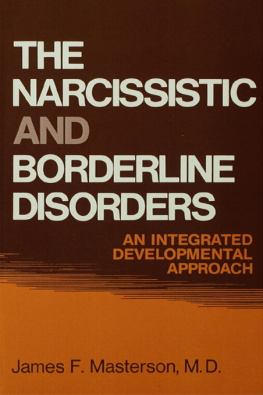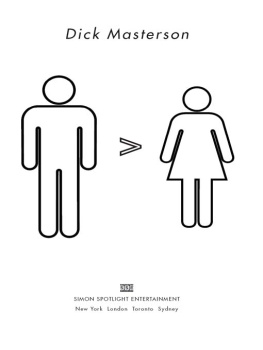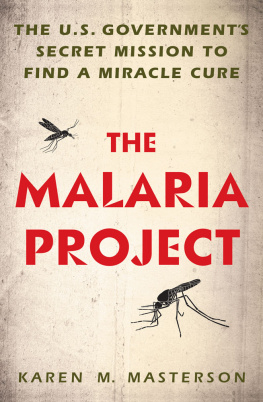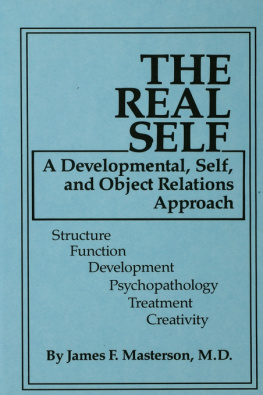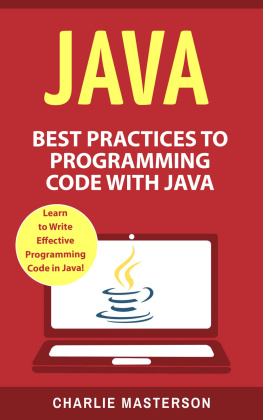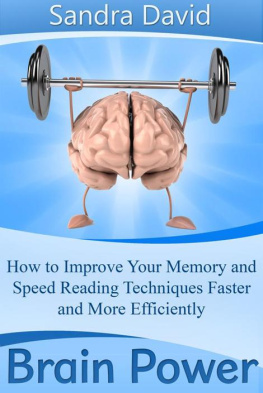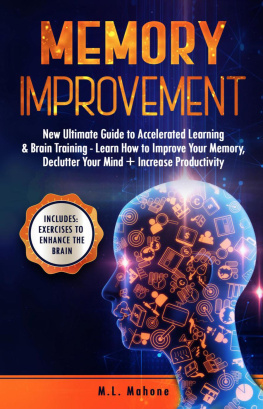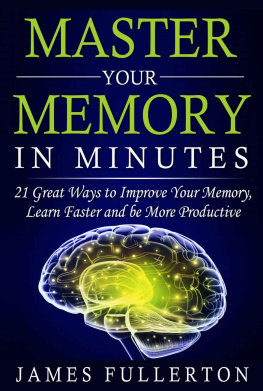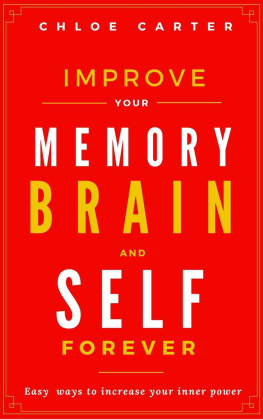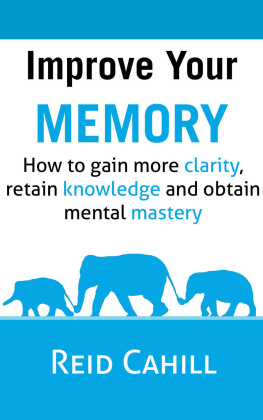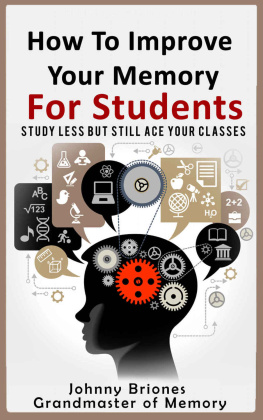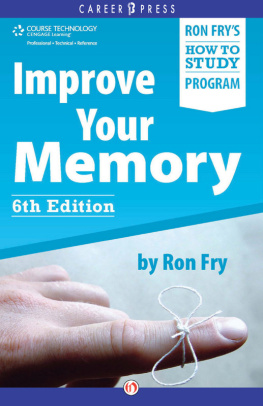Introduction
Have you ever noticed that some people are able to effortlessly remember even the most boring details, and quickly understand new things, and wished that you too could be like that? Well, you can. To unlock the full potential of your brain, you need to keep it active and acute. Besides getting out flashcards, what can you do to help remember things better and learn new things quicker?
Memory isn't like a muscle, something specific you can exercise, it involves organising information in your brain. To improve your memory, you need to change and re-organise the way you think and thus helping to support how your memory works.
Before we get started, think about all the times you've been told to remember something. Maybe it was something you needed to memorize for a test in school or maybe you had to memorize something for a work presentation, or recalling trivia. Have you ever been taught to memorize? That's what this ebook is all about. It's about improving your memory. We'll cover a variety of principles and techniques that can be used to improve your memory. We'll go over how your memory works and how you can apply specific techniques to enhance your memory in a assortment of situations.
We all remember information in different ways. Do you learn new things better by reading, watching someone else, by trying the task yourself or by listening? Maybe a combination of them works better for you.
It is important to understand that memory traces are not perfect little packets of information that lie inactive in the brain, waiting to be summoned forward to give an accurate account of past experiences. We often have errors in our memory, which would not exist if memory traces were perfect packets of information. Consequently, it is incorrect to think that remembering involves simply reading out a faithful record of past experience. When we are required to remember past events, we reconstruct them with the aid of our memory tracesbut also with our present belief of what happened. Memory is a construction of what you actually recall and what you believe happened.
Memory refers to the capacity to store and recover information over time. For some information our memory is very good, but our dynamic cognitive processing of information assures that memory is never an exact reproduction of what we have experienced.
Another way of understanding memory is to think about it in terms of stages that describe the length of time that information remains accessible to us. Information begins in sensory memory, moves to short-term memory, and eventually moves to long-term memory. But not all information makes it through all three stages; much of it is forgotten. Whether the information moves from short term memory into long term memory or whether it is misplaced from memory entirely depends on how the information is attended to and processed.
What causes some people to lose their memory while others stay sharp as a tack? Genetics play a role, but so do choices. Proven ways to protect memory include following a healthy diet, exercising regularly, not smoking, and keeping blood pressure, cholesterol, and blood sugar in check. Living a mentally active life is also important, too. Just as muscles grow stronger with use, mental stimulation helps keep mental skills and memory in tone.
There is no such thing as a "bad memory". Everyone has the ability to improve their memory, as long as you are not suffering from memory loss as a medical condition. If you want to improve your memory, there are a number of things you can do.
By the time youve reached adulthood, your brain has developed millions of neural paths that help you process and recall information, solve familiar problems, and perform familiar tasks with minimal mental effort. But if you always stick to these well-worn paths, you arent giving your brain the stimulation it needs to keep growing and developing.
Memory is not a finite resource, and with techniques like repetition, association, and visualization, you can improve your memory before it starts to fade. This ebook demonstrates to readers of all ages how to improve their ability to recall information.
In many ways, our memories form who we are. They make up our core biographies. They tell us who we're attached to, who we've touched during our lives, and who has touched us. Our memories are crucial to the essence of who we are as human beings. What causes some people to lose their memory while others stay sharp as a tack?
Are certain kinds of "brain work" more effective than others? Any brain exercise is better than doing nothing. The activities with the most success are those that require you to work beyond your comfort zone.
And although the majority of our memories before age three or four are gone, there are plenty of ways we can contribute to brain health moving forward.
You have most likely walked into a room and suddenly realized you cant remember why you needed to be there in the first place. Dont worry, youre not getting more forgetfulchances are it was the act of walking through a doorway that made you go completely blank! Researchers have found that participants in studies were far more likely to forget what object they had just placed in a container if they were asked right after walking through a doorway than if they carried the object the same distance in a single room. Scientists have yet to figure out why, but something about entering a new environment causes our memory to restart.
The hippocampus or part of the brain accountable for memory regulation is thought to have about seven spaces that hold an unknown amount of memories at a time. Our short-term memory allows us roughly 30 seconds to process and use information we receive before it's replaced with something better. If we use it in time, we can log it into our long-term memories, where it can stay with us forever.
The brains inconceivable ability to reshape itself holds true when it comes to learning and memory. You can harness the natural power of neuroplasticity to increase your cognitive abilities, enhance your ability to learn new information, and improve your memory - at any age.
Recalling a memory is easier if its been strengthened over time, and each time we do so, we run through that same arrangement of brain activity again, making it a little stronger.
If you don't challenge your brain with new, surprising information, it eventually begins to deteriorate. What research into brain plasticity shows us is that by providing your brain with appropriate stimulus, you can offset this degeneration.
With that, let's go ahead and get started with improving your memory.
TYPES OF MEMORY
As mentioned earlier, the determination of what information makes its way through the different stages depends on what you pay attention to and process at the time. Information that you pay attention to and process will move to the next stage of memory.
Studies on the sole basis of learning and memory have revealed several distinctive phases of memory that can be distinguished by their time course.


